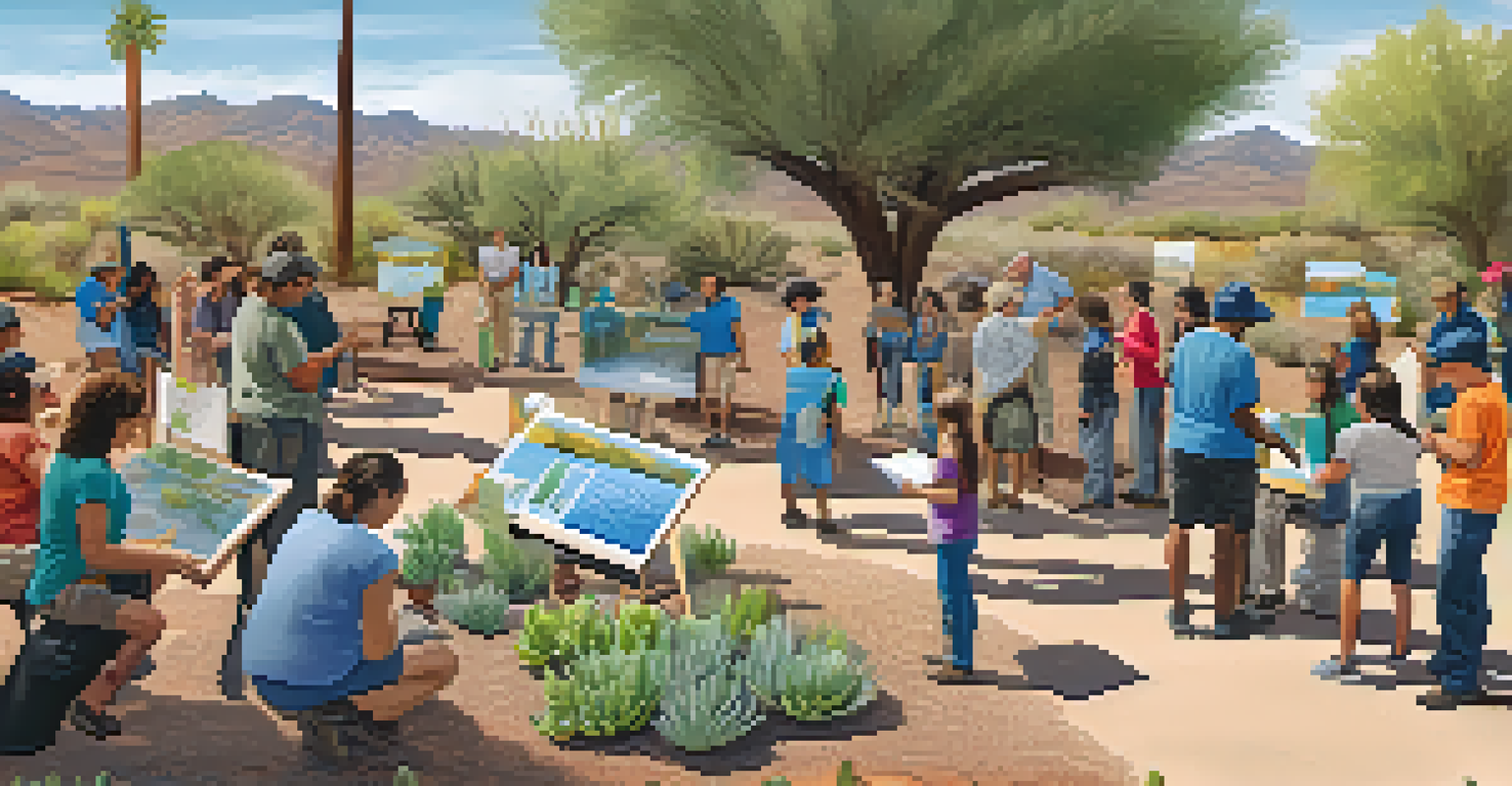Innovative Rainwater Harvesting in Tucson: A Historical View

Understanding Rainwater Harvesting in Tucson's Climate
Tucson, located in the arid Sonoran Desert, faces significant challenges with water scarcity. Rainwater harvesting provides a sustainable solution, capturing precious rainfall to supplement water supplies. This method has deep historical roots in the region, stemming from the area's indigenous cultures who recognized the importance of water conservation.
Water is the driving force of all nature.
The harsh climate, characterized by long dry spells and sporadic monsoons, makes efficient water management essential. By collecting rainwater, residents can alleviate some of the pressure on existing water resources. Innovative techniques have evolved over the years, reflecting a blend of traditional wisdom and modern engineering.
From simple catchment systems to more advanced technologies, Tucson's approach to rainwater harvesting has continually adapted. This flexibility highlights not only the necessity but also the ingenuity of its people in facing environmental challenges.
Historical Practices: Indigenous Techniques of Water Capture
Before modern systems were developed, indigenous peoples of the Tucson area utilized natural topography to collect and store rainwater. They built structures like check dams and rock basins to slow down runoff and encourage absorption into the soil. This sustainable practice ensured that even during dry seasons, water remained accessible.

For these communities, water was not just a resource but a way of life. They understood the land's rhythms and worked in harmony with it, creating a legacy of water management that is still relevant today. The knowledge passed down through generations laid the groundwork for contemporary harvesting methods.
Rainwater Harvesting's Historical Roots
Tucson's rainwater harvesting practices are deeply influenced by indigenous techniques and Spanish colonization, blending traditional knowledge with modern innovations.
By studying these historical practices, modern Tucsonans have found inspiration for innovative rainwater harvesting solutions. The blend of old and new reflects a deep respect for the environment and a commitment to sustainable living.
The Role of Spanish Colonization in Rainwater Systems
The arrival of Spanish colonizers in the 17th century introduced new agricultural practices that influenced water management in Tucson. They brought with them advanced irrigation techniques, including the use of canals and cisterns, which complemented indigenous methods. This exchange of ideas marked a significant evolution in how water was collected and utilized.
The greatest threat to our planet is the belief that someone else will save it.
Spanish settlers often adapted existing indigenous systems to suit their agricultural needs, creating a hybrid approach to water management. These adaptations helped establish a more organized method of rainwater harvesting that laid the foundation for future developments. The blending of cultures resulted in innovative practices that enhanced the region's resilience to drought.
While the colonial period brought challenges, it also fostered creativity in addressing water scarcity. The legacy of these early adaptations is evident in modern rainwater systems, which continue to evolve while honoring historical practices.
Modern Innovations in Rainwater Harvesting Technology
Today, Tucson is at the forefront of rainwater harvesting innovation, with technology that captures and utilizes rainwater efficiently. Advanced systems include rooftop catchment, storage tanks, and filtration methods that ensure clean water for various uses. These innovations have made it easier for homeowners and businesses to integrate rainwater harvesting into their daily lives.
Local organizations and government initiatives have played a crucial role in promoting these modern practices. Educational programs and incentives encourage residents to adopt rainwater harvesting, making it not just a necessity but a community-driven movement. This collaborative effort has led to an increase in the number of systems across the city.
Innovative Technologies Enhance Harvesting
Modern advancements in rainwater harvesting technology, such as rooftop catchment and smart sensors, are making it easier for Tucson residents to utilize this sustainable resource.
As technology continues to advance, Tucson's rainwater harvesting methods are becoming more sophisticated. Innovations like smart sensors and automated systems are making it easier to monitor and manage water resources, ensuring that this vital practice remains sustainable for future generations.
Local Policies Supporting Rainwater Harvesting Initiatives
Tucson's local government has recognized the importance of rainwater harvesting and implemented supportive policies to encourage its use. These initiatives include zoning regulations that require new developments to incorporate rainwater systems, as well as tax incentives for homeowners who install harvesting equipment. Such policies reflect a commitment to sustainable water management.
In addition to regulations, community programs provide resources and support for residents interested in rainwater harvesting. Workshops, grants, and technical assistance help demystify the process, making it accessible to everyone. This proactive approach not only fosters community engagement but also enhances the city's resilience to water shortages.
By aligning local policies with innovative practices, Tucson is setting an example for other cities facing similar challenges. The collaborative efforts between the government, organizations, and residents demonstrate how a united approach can lead to meaningful change in water conservation.
Challenges and Opportunities for Future Rainwater Harvesting
Despite its successes, Tucson faces ongoing challenges in expanding rainwater harvesting practices. Issues such as limited public awareness, initial costs, and maintenance concerns can deter residents from adopting these systems. However, addressing these barriers presents opportunities for growth and innovation in water management.
Educational outreach and community involvement are essential for overcoming these challenges. By increasing awareness about the benefits of rainwater harvesting, Tucson can inspire more residents to participate in sustainable practices. Additionally, fostering partnerships between local organizations and homeowners can create a supportive network for those interested in implementation.
Community Engagement Drives Success
Active community involvement and local policies in Tucson are crucial for promoting rainwater harvesting and fostering a culture of sustainable water management.
The future of rainwater harvesting in Tucson is bright, with potential for continued innovation and expansion. As technology advances and the community becomes more engaged, Tucson can further establish itself as a leader in sustainable water solutions.
Community Engagement: The Heart of Tucson's Water Strategy
Community engagement is vital to Tucson's approach to rainwater harvesting, creating a sense of ownership and responsibility among residents. Local groups have organized events, workshops, and informational sessions to educate the public about the importance of water conservation. These initiatives foster a collaborative spirit that enhances the effectiveness of rainwater harvesting efforts.
By bringing people together, Tucson has created a network of advocates who are passionate about sustainable practices. This grassroots movement empowers individuals to take action and make informed choices about water usage. As residents become more involved, they contribute to a larger cultural shift toward sustainability.

The commitment to community engagement not only strengthens Tucson's rainwater harvesting initiatives but also ensures long-term success. By nurturing this connection, the city can continue to innovate and adapt, addressing challenges while celebrating achievements in water conservation.